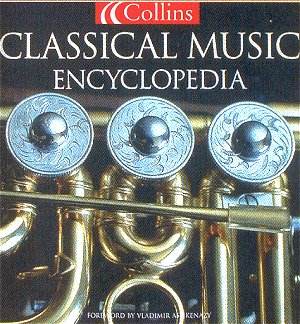Book Review
Collins Classical Music Encyclopedia
General Editor: Stanley Sadie. Foreword by Vladimir Ashkenazy
Published by Harper Collins Large Format Hardback 384 pages ISBN 0 00 472390
2
£29:99
Amazon
UK £23.99
Amazon
US $36

This beautifully produced and lavishly illustrated book includes some novel
features that lift it above the average coffee table, beginners-guide-to-music.
To begin with, it starts off by recognising that there are other forms of
music than the classical western styles with which we are so familiar. In
an informative section on world music, we are introduced to the less familiar
musical forms of China, South Asia, Southeast Asia, The Americas, Africa,
Oceania, the Near East, and Greece and Rome.
Another novelty is the introduction of six major themes that thread their
way through the book and which are colour coded and signposted, backwards
and forwards, at the top of each page through the book. The most unusual
and perhaps the most significant of these themes is 'Women in Music' covering
their often unrecognised and unappreciated role as both composers and performers.
The other five themes are: 'Arts and Culture' embracing artistic and cultural
activities - and people - that relate to and help contextualize the music-makers;
'Inside the Music' covering the emergence and development of music theory,
technology and musicology; 'The Voice' tracing the history of significant
singers, events, developments in, and contributions to vocal music; 'Performance'
including significant performers and performance events, premières,
debuts, audience reception and consequences; and 'Influences'. The latter
allows the reader to follow connections in two directions, indicating the
influence composers had on subsequent generations and music that influenced
their own style.
In common with similar books, the Encyclopedia includes discussions under
the usual headings: The Medieval Era; The Renaissance; The Early Baroque;
The Late Baroque; The Classical Era, The Early Romantic; The Late Romantic;
The Modern Era and, perhaps not so usual - The Late 20th Century.
Each section discusses the music of the period in their political and social
historical contexts. Potted biographies of major composers, active in each
era, are included, plus discussions of the styles and forms of the music.
Advances in the development of singing and the technology of instruments
are covered and suggested works for listening given, together with recommended
CDs - which is where I have a major quarrel for in too many instances there
is too much dwelling on single works and too many keystone works ignored.
The Listening Guides are very useful. Take an example -- Josquin des Prez's
Pastor Noster/Ave Maria. The motet is broken down into its sections and a
refined 'strip cartoon' approach with graphic 'heads' symbols is used covering
each solo voice and choral entry. This striking and highly effective visual
approach is repeated through the book so that for Monteverdi's Vespers, for
instance, instrumental entries are included too with pictures of the specific
instruments.
A very useful book for those exploring the world of music. I cannot think
of a more intriguing and worthwhile Christmas present.
Ian Lace


